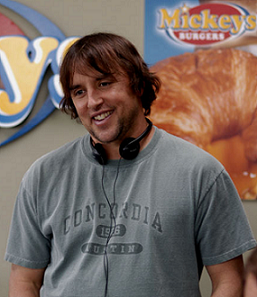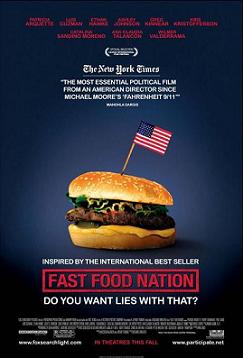
Main Page
Interviews Menu
Alphabetical Menu
Chronological Menu


Review of Fast Food Nation Richard Linklater, better known within the film industry as "Rick", directs Fast Food Nation about Don Henderson (Kinnear), a marketing executive for a fast food chain, who travels to his companyís meat factory to investigate reports of meat contaminated with fecal matter. Based on the book of the same title by Eric Schlosser. Richard Linklater has directed such films as A Scanner Darkly, Bad News Bears, Before Sunset, The School of Rock, Waking Luke, Suburbia, Before Sunrise, Dazed and Confused and Slacker. I had the privalege to interview him. Fox Searchlight Pictures will release Fast Food Nation on November 17th, 2006. NYC MOVIE GURU: When did you become vegetarian and why? RL: 1983. I kind of came to it slowly. I was brought up thinking that if I didnít eat meat every day, I would die. I had already read [the] book Animal Liberation, a Peter Singers book from the 70ís. I was looking at it from that angle. It wasnít an overnight thing, but once it was definitive, it was pretty definitive. Iím happy that, for 23 years, I havenít supported [meat]. I talked to a lady once who said [that] for every year you donít eat meat, 100 animals donít get slaughtered. NYC MOVIE GURU: Do you consider yourself to be a political filmmaker? RL: People are like, ďOh, are you political now?Ē Iím the same political person that I [always was]. I think the movies themselves demand some analysis. If you analyze them at all, you canít help but see them in political terms. A Scanner Darkly is more specific in right now than Fast Food Nation which is about an industry that has been the same for a while. NYC MOVIE GURU: Why did you include the gruesome scenes in the slaughterhouse? RL: I think the film needed [the scenes in the slaughterhouse]. Itís all about the reality behind the thing. That is the reality that they keep hidden thatís so prevalent. Thatís why Iím not even shocked by it. 10 billion animals a year are raised for human consumption. If you canít accept that reality, then youíre just living in a dream-world. I think that everybody has to make up their own mind about it, but to be so willfully ignorant about it. Itís just like war. If weíre going to bomb a country and occupy a country and then weíre going to treat a civilian casualty like itís an aberration. No, what [they] are doing is supporting thatóitís going to be a lot of civilian deaths. Itís the same with this industry. Yeah, itís going to be a lot of bad stuff, [i.e.] environmental degradation. Itís everything that [Fast Food Nation] portrays is the reality behind these industries, but it has been one thatís very, very [secretive]. Youíre not supposed to think about it. Youíre not supposed to analyze it. The more important stuff is in our culture, [i.e.] life, death, health, the more youíre not supposed to think about it. NYC MOVIE GURU: How difficult was it to get permission to film at the different locations? RL: It was tough getting access. [Directing] this movie was a little like being an undercover investigative person. We had to emphasize getting the meat processing facilities, for instance. We emphasize the story of the Mexican workers going north and we said, ďThis wouldnít be seen as Mexico; this would be seen as Colorado.Ē People sort of like that [traditional] immigrant story which doesnít get told much in the American media. Itís no big deal to the [Mexican workers]óthatís just another job down there. NYC MOVIE GURU: How did you feel while shooting in the slaughterhouse? RL: I could feel my own psyche babbling there. Because you want to go through life as a [sensitive] person about everything around you. I could feel myself willingly shutting down the compassion. The human psyche has an incredible latitude for survival and for justification. If youíre ever in a traumatic situation, itís interesting to be conscious at that moment and to really engage how youíre feeling and to see what mode you jump into. I jumped into filmmaker mode. NYC MOVIE GURU: What are your methods of directing? RL: I have pretty specific methods. Theyíre hard to describe, but I just like a lot of rehearsal time. I like to spend a lot of time communicating. Itís just my own way, but I think thatís the most magical moment in the process where the script meets the person whoís going to physically manifest [the] idea of that character. Thatís the crucial moment, to meówhether itís casting or changing the script to fit them [or] bringing them in as a creative collaborator. Thatís my natural instinct. The most enjoyable parts are rehearsal and shooting. I approach all actors the same. They both need different thingsóitís kinda like being the head coach of a team. You gotta just sense that and work with people within their own boundaries. NYC MOVIE GURU: What problems did you encounter while shooting? RL: [There were] things like no lights, but you had to work around the limitations. No timeóyou have 3 hours to shoot the thing. Itís challenging. NYC MOVIE GURU: How did you end up casting Avril Lavigne? RL: I just met her [at a casting session in Los Angeles]. She came in and auditioned for the part of Amber, which Ashley [Johnson] ended up playing and, after talking to her, I really liked her. Sheís interested in the subject. I think she liked the book a lot. I didnít think she was quite right for that part, but then I was thinking [that] maybe she could play the college girl. Itís funny with those college kids in that sceneónone of them had been to college. NYC MOVIE GURU: How did you Bruce Willis get involved? RL: I just sent him the script. I just kinda needed somebody like Bruce Willis. Iíve had friends who had worked with him. I didnít know him, but I had a hunch that he might dig that part. I was lucky. I guess he wasnít doing anything else that momentóit was only for one day. Itís fun [for actors] to just go in there and do character work and the whole film is not on your back. You can get in [and] get out. Itís a fun scene [and] an essential scene for the movie and it had to be someone like [Bruce Willis]. The complexity of that character [and] what heís talking about is interesting. Itís the same with Kris Kristofferson, Ethan Hawke, Luis Guzman [and] Patricia Arquette. A lot of them were ironic like Esai Moralesóheís a real activist. For him to be playing a straight manager, he found that to be kind of ironic. And Patricia Arquette is just the complete opposite. Yet, actors want to do stuff like that. NYC MOVIE GURU: How often do you think about the actors while writing the script? RL: When you [write] the script, you donít really think about the actors. Itís a real practical thingóyou canít afford them, theyíre busy. I never write with anyone in mind. Even Ethan [Hawkeís] character, I wrote that part not knowing who was going to play it. Itís just when I realized that heís not doing a play, heís not doing a movie at the moment, maybe Iíll send [the script] to him and maybe he would like it or be available. But I donít take it for granted that he would want to [take the role]. Ultimately, they have to pick you. When youíre not paying anything, they have to want to do it. NYC MOVIE GURU: What do you want audiences to take away from Fast Food Nation? RL: For a screening we had, a lady came up to me and said, ďIíll never be able to eat that meal again and not think about whatís behind.Ē I [thought] ďWow. I think thatís what the movie wants.Ē [You should] at least analyze this world that rests on willful ignorance. One source [alone] canít open your eyes, but thereís a lot of informationóa lot of non-fiction information. NYC MOVIE GURU: How do you feel the general public views fast food? RL: We all live in this myth. Anything that shatters the myth that I grew up in and [that] every American does about, ďOh, thereís a family farm out there. They grow these crops, thereís some pigs and some chickens running around and thereís a cow for your milk which they eventually slaughteróand thatís your hamburger. Once you throw that out, you realize that itís these factories. Like that chicken never saw light-of-day, its feet never touched the earth. It lived in a cage with 5 other chickens pumped full of hormones.Ē Once you realize how unnatural and systematically cruel that world is, itís a real eye-opener. That myth in your head is based on them not showing you. It wouldnít help them to let you see where [your burger] comes from, but thereís a lot of disconnects in our food chain. We love animals instinctually, but then [we] realize [weíre] eating all of those animals. Itís crazy. NYC MOVIE GURU: What scripts are you working on next? RL: One [script] deals indirectly with Iraq. Another takes place in the 30ís. [Another] is a jazz movie. [My scripts are] all over the map. Main Page Interviews Menu Alphabetical Menu Chronological Menu ______________________________________________________ |
The NYC Movie Guru
themovieguru101@yahoo.com
Privacy Policy